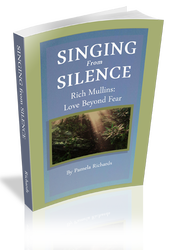There are people who think this is just a sad story, and when that's the only thing they say about it, I'm pretty sure they missed something. Where there is life, there is hope: Rich Mullins is most definitely alive. I know it, not only because I've been taught that way all my life, but also because I've encountered him. Where there isawareness of eternal life, there is faith. Where two are more are gathered in his name, there is love: a living, shimmering wall of love higher than I can reach, wider than my imagination can span, deeper than any measure. That's what Richard showed me.
In order to tell the truth, I am limited to writing from my point of view. Necessarily, Singing from Silence reveals a good number of my own life experiences. I was describing the book to a friend who offered to review it for me and when he heard it was a memoir, he said, "And so you're always right?" "No," I had to admit. "It's a true story, so I'm pretty much consistently wrong." I'm a human being: sometimes I act idiotic or foolish, and some of my experiences defy reason.
That’s why I learned so much from Rich Mullins; and why his friendship and loyalty to me were so impressive.
I've never been fond of admitting I was wrong. You have to live your life differently when you realize your error. Stubborn people like me don't want to change. But learning that you’ve been seriously mistaken isn't so bad once you realize it just shows how much you've been loved.
Someone once said that Richard loved broken people. Richard loved the way God does. God does not hold himself back from our brokenness; he enters it with us. Jesus Christ has to be the most broken person ever to live, and I know how much Richard loved him.
Richard used to point out that God is an artist. When he is breaking us, he is making us into art. Our humanity makes us attractive to him; our brokenness allows us him to transform us. If we could only see as God does, we too would see beauty in the brokenness. It seems to me Richard looked through God’s eyes.
Living a righteous life--and really, that's just an illusion, because the moment we even think we’re more righteous than the next person, we are no longer seeing through God's eyes, but with our own faulty vision--does not in any way guarantee that we will understand what God wants for us. When Job lived a righteous life, God broke him on the very pillars of his own virtue. Job cried out: "Why?" And God did not answer his question. Instead, he showed Job his mighty works, and asked him, "Where were you at the foundation of the universe?" If we think we can accomplish a spiritual act through restraint, God can show a thousand million acts accomplished through sheer creative force. When he breaks us, God is initiating a creative act. But his work is not yet complete; our upstart questions are premature.
Richard always respected his intuition; he was glad to be led by it. I, on the other hand, spent years attempting to reconcile my intuitive flashes with rationalism, and my attempts led to disaster. Richard was known to say that empiricism is dead. It has already shown us all it has to offer. There are experiences that exist beyond our five senses, yet still they can instruct us if we will let them.
I've learned that while giving seems to be my gift, once in a while I have to take turns and receive so someone else can have the blessing of giving for a change. After all, that's what Jesus is begging for; a chance to give, if only we will receive.
I've come to believe that Richard is right: God calls us to a love that is warm and productive, not one that is sterile and withdrawing. Perhaps that is one reason God's love is described as passionate in King Solomon's Song of Songs or Hosea.
When we know we are loved, our creative expression is set free. I was always a more creative person
when Richard was around. Perhaps it was because Richard thought everything I did or said was wonderful. I did plenty of stupid things; I don't even remember all of them, I'm sure, but I'll bet I could have worn eggshells for a hat and he’d have been thrilled, not because of the silly hat, but because it was me there underneath it--the hat was just the way I’d chosen to express myself. I told that to a friend and she said, "That's just like God's love!"
Exactly.
Since confronting my memories of Richard again in 2009, I've written two books, built several websites, and begun studying the Old Masters by copying their works using materials they might have used. In the past four months, I've
completed three paintings and embarked on two more. These are not things I was doing during the years I was trying not to remember him. In my mid-fifties, I have more passion, drive, stamina and commitment as an artist than ever before.
I have actually worked up the nerve to publish this book, which has been a challenge for me. The fears I've had to face in order to publish have been deep and many. I was tempted to be more self-protective, but I learned to rely on Richard's teaching: if our expression does not come from life, if it is not true to our experience, our labor is for nothing and our attempt at art is stillborn. This one is definitely kicking.
It is my belief that as long as I’m telling truth from my heart, from my own experience, Richard would approve. If the book is seen as controversial, well, nothing would have pleased Richard more. He loved to stir people's points of view; his love of controversy was one of the dynamics that drove his art.
* * * * * * * * * *
Pamela Richards 2011


 RSS Feed
RSS Feed
